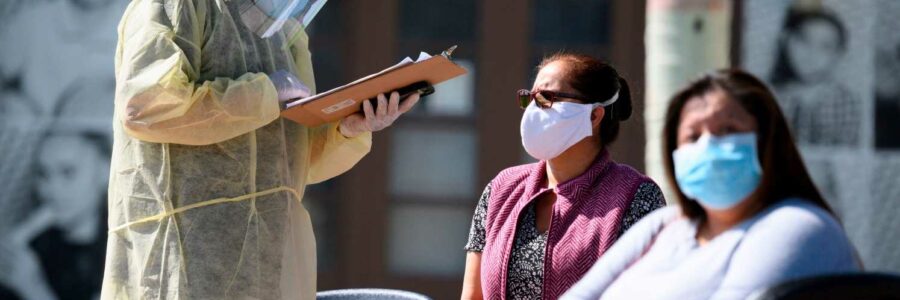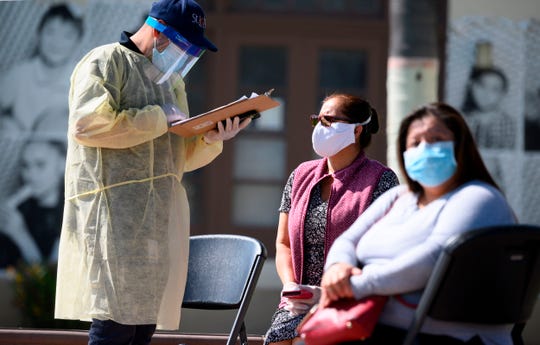
COVID-19 front lines need community health workers, yet they’re not getting needed support
As a community health worker and executive director of the National Association of Community Health Workers, I’ve spent the past year gathering insights about the mental and emotional challenges for the people on the front lines of pandemic response in neighborhoods across America.
I know well the anxiety and guilt they feel trying to comfort and support families who’ve struggled through loss after loss in isolation and uncertainty.
Yet, on top of pandemic-induced pressures, recent events form a grim reminder of other, enduring American crises that our community responders face: a string of mass shootings and the catastrophic consequences of racism.
The horror of the March 16 Atlanta mass shooting of eight individuals, six of whom were from Asian communities, floored me. After the news broke, I called Theanvy Kuoch, a Cambodian CHW who has been a mentor, elder and friend for 10 years. Long before she had the title of community health worker, Theanvy channeled her lived experience as a survivor of enslavement, hunger, disease and loss from the 1970s Cambodian holocaust to support people living in her refugee camp.
Four decades ago, Theanvy founded Khmer Health Advocates in America, bringing trauma-informed therapy, health and social services to other newly arriving refugees.
During my recent call to Theanvy, so many questions flooded my brain. How was she doing? How had the news of the Atlanta killings of Asian women, along with the rise in overall racist attacks against Asian Americans, affected her? Affected her clients? And what did she and other CHWs need from partners and allies to be able to provide services in her community?
Community health workers push past their own risk factors and barriers to ensure that the families they serve can get tested for and gain equitable access to vaccinations and medical treatments. (Photo: ROBYN BECK, AFP via Getty Images)
In the ongoing scramble to confront and conquer COVID-19, America needs to sharpen its focus on unheralded front-line community workers like Theanvy. Daily, community health workers push past their own risk factors and barriers to ensure that the families they serve can get tested for and gain equitable access to vaccinations and medical treatments.
By the end of April 2020, when the COVID-19 death toll in the United States was over 62,000, Theanvy and I had collaborated with the Austin Asian Community Health Initiative to create a guide for CHWs that addressed the growing violence, stigma and blame against persons of Asian descent. We wanted to promote ways that CHWs can support our Asian American and Pacific Islander community members.
They’re doing the work of contact tracing, street outreach, eviction support, delivering diapers, medicine and food, advocating for immigrant rights and worker protections, and grieving with families. It’s work that would challenge the most physically and emotionally healthy among us.
As the STOP AAPI Hate website tracks increasing crimes against Asian Americans, Theanvy and other CHWs must increase their daily workloads by accompanying people who are afraid to go the grocery store or to travel to get their vaccine. They’re also comforting people suffering from depression and anxiety due to racial violence. And they’re doing it without bonuses or subsidies, and with no fanfare.
Working conditions are often difficult
Advocating for CHWs has never been easy. Most provide their services outside of established health services and systems. As a precarious workforce, predominantly made up of females of color in some of the lowest-paying public health jobs, they often lack career advancement opportunities.
Our community-based organizations are often not eligible to apply for grants that fund CHW services and research. Without infrastructure support, our power to advocate for vulnerable communities is diminished.
In the early days of the pandemic, the Department of Homeland Security identified CHWs as essential critical infrastructure workers who can provide significant contributions to COVID-19 emergency response efforts.
This guidance, along with nearly 60 years of research on CHW effectiveness, two decades of public health recognition, landmark workforce development studies and a national labor classification, should have engendered respect and authentic partnership with CHWs as public health professionals. Sadly, many of us remain undervalued.
How to support health workers
In February, my organization released a National CHW Policy Platform, created over the past year with hundreds of community health workers, networks and allies. It is an important tool to promote national professional identity, leadership and capacity of CHWs and our associations.
These policy recommendations feature best practices that can guide integration into larger COVID-19 response efforts. But unless public and private institutions heed the advice, these vital workers will continue to be sidelined.
It is past time to recognize the underappreciated expertise and capacity of our community health care workers, many of whom are coping with immense suffering and an ever-increasing need for their services.
With vision, we can transform our experiences during the pandemic into an authentic movement for health equity, with adequately supported community health workers at the center.
Denise Octavia Smith, the founding executive director of the National Association of Community Health Workers, is an Aspen Institute Healthy Communities fellow.
You can read diverse opinions from our Board of Contributors and other writers on the Opinion front page, on Twitter @usatodayopinion and in our daily Opinion newsletter. To respond to a column, submit a comment to [email protected].
Source: Read Full Article
